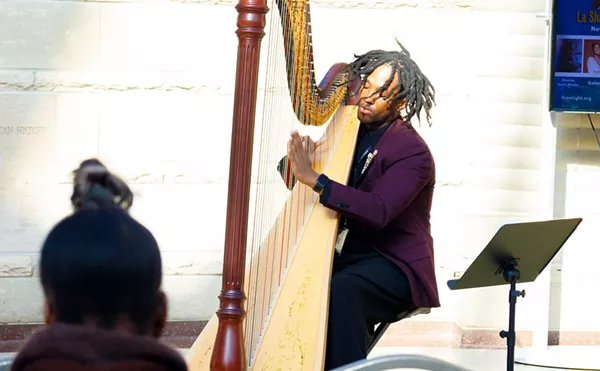
Audio By Carbonatix
[
{
"name": "GPT - Leaderboard - Inline - Content",
"component": "35519556",
"insertPoint": "5th",
"startingPoint": "3",
"requiredCountToDisplay": "3",
"maxInsertions": 100,
"adList": [
{
"adPreset": "LeaderboardInline"
}
]
}
]
It's always been a bit of a comical irony that R.E.M. hit superstardom during the middle part of their career, signing a reported million-dollar contract with Warner Bros. in the late '80s, just as they began to lose a lot of their initial thunder. This was a band, after all, that peaked with its first several releases. The first EP, Chronic Town, and then the debut album, Murmur — both still classics — set the stage for a new indie rock model that was desperately needed at the time, combining certain mellower elements of the Velvet Underground and the subsequent early punk bands (Patti Smith, Television, etc.) with their own unique Southern (as in Georgia) take on the form. They didn't sell millions — R.E.M. literally played to something like 10 fans the first time they played Detroit — but the influence still reverberates to this day.
Despite Murmur's brilliance, though, Reckoning remains the best of the bunch. The sophomore effort (no slump here!) spotlighted genuine pop tunes in the form of the opening "Harborcoat" (featuring a pop hook chorus worthy of the Beach Boys), the more mournful "Southern Central Rain (I'm Sorry)," and the country-ish, Americana prototype of "Don't Go Back to Rockville." "Pretty Persuasion," meanwhile, featured Pete Buck guitar riffs and hooks that were strong enough to be the envy of hard rockers, both past and present.
It also took a bit of genius to include a song ("7 Chinese Brothers") that cryptically addressed a childhood magic tale that most baby boomers grew up reading or hearing — one brother could swallow the ocean, etc., etc. (it was, in fact, on one of the first records this reviewer owned as a child). This was still the era in which Michael Stipe's lyrics were almost indecipherable — and it could be strongly argued that R.E.M. was much better when listeners mostly couldn't understand what Stipe was singing. Being cryptic was part of the charm. When he sang one decipherable line — "Jefferson, I think we're lost" — during the closing "Little America," most listeners assumed it was an elegy for a dying America (as in Thomas Jefferson) as opposed to a literal reference to their manager at the time, Jefferson Holt. When the facts were later discovered, it took a little of the magic away. Buck told me at the time that the lyrics had more to do with the indecipherable rock tradition of songs like "Louie, Louie" as opposed to "some French symbolist poet." And indeed, this was rock 'n' roll. Of the highest order. None of that latter-day "Stand" or "Orange Crush" nonsense. Just 10 classic tracks, not a bum moment among them. It's nice to know that something that has remained so brilliant in memory remains so in reality.
This Deluxe Edition includes a second disc, featuring a live concert from the era that opens with the token Velvets cover ("Pale Blue Eyes") and then follows with tracks from the EP and two released albums as well as a preview of tracks (including "Driver 8") from their then-upcoming third full-length, Fables of the Reconstruction.
Bill Holdship is the music editor of Metro Times Send comments to bholdship@metrotimes.com.





